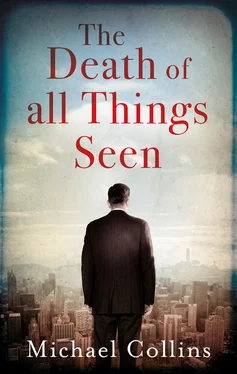Nate looked up. His head was not clear. He needed to voice what he was thinking. He made his appeal. ‘You see, Ursula, what this woman has done to my mind?’ He was standing in the half-light, the curtains drawn in advance of viewing the tapes. ‘This is the trap she set for me.’
*
The tapes had all been recorded at the office. The ones he was interested in were taken post Norman’s birth, in a lapse of almost two months when Helen Price was not there to run the camera. It was easy establishing how Helen had filed the tapes.
The reel rolled in static-filled black and white in contrast to what was, back then, a glorious day of brilliant light and cut shadows. His father stepped into and out of frame, a series of out-takes that had never been edited. They had simply been recorded, labeled and stored.
There was no narrative, no purpose and, eerily, no sound. The tapes simply existed, a contrail of memory, evidence that survived the act itself, eclipsing time, this the sort of evidentiary material St Peter might be charged with reviewing in the great assessment of a life, in advancing one’s destiny toward Heaven or Hell.
*
There was the single sequence at a certain date. Nate fed the reel in a blurred advance and arrived at a scene. Helen Price’s gloved hand adjusted the lens. She emerged, walking away from the camera, this woman, now dead, the spread of her hips betraying what had happened and so recently. Nate held his breath. He cared little about Helen Price. She was there in the historical record. To get to his father, he had to go through her.
Her hair was combed in a wave off her forehead. She was drawn, her eyes sunken, suggesting a period of convalescence, her lips a shade not identifiable in black and white, and yet he observed the exercising control she maintained, an influence and presence that would not be dismissed. It was communed in the quiver of her hold in the crook of his father’s arm, this the first time Helen Price had appeared alongside his father, his father suffering through it, and left holding the baby. There were sayings that literal.
They both looked stunned. It was recorded without sound. It went on longer than it should. His father’s lips began moving. He spoke out of the corner of his mouth. He was saying something. It added a solemnity and underlying mystery to have his father speak and not hear it.
He remembered far back with Ursula, how she had quieted him on their first night after the act was done. She had wanted to hear his heart and not his opinions. Words meant so little and he had quietly caved to a love that would sustain them. It was the opposite in this instance, the silence so sharp in the insistence of an underlying rage barely contained.
In releasing the child, there was opportunity for some show of affection. His father was a head taller, his lips near the crown of Helen Price’s head. He did not kiss her, when, at one point, there had been an act and an intimacy that begat a child, and Nate felt a deepening sense of her pain, for the betrayal of what had happened.
Nate stopped the projector at the moment the child was surrendered and they were suddenly out of frame. In their absence, he could see the shrouded relief carving of a giant Egyptian and Indian cradling time aloft out over the city.
It was 4.46 p.m. by the clock, deep afternoon in late April 1963. April 22 to be precise.
Nate checked the historical meteorological records. The mercury read sixty-two degrees at two in the afternoon in what was described as a week of glorious weather, a high pressure front of blue skies. It was a point of no importance, but a fact, nonetheless, that could be accessed on the Internet. The Cubs were playing well out of the winter pen in Arizona, in advance of what would be their first winning season since 1946. Jack Brickhouse was making the calls on WGN.
Nate spent another hour screening reels in the way an ad man might audition actors for a part. His father wore his pants cinched above the hips. He had a figure not dissimilar to Clark Kent, as played by a vintage George Reeves, the original Superman, when vainglory and heroism were not necessarily aligned, the glasses worn such a weak conceit. It was, he understood, less Lois Lane being actually duped, as her wanting to be duped, to permit normalcy to proceed alongside valor as it did, or had, in the lives of so many who had served during the war effort.
Nate fed another spool, unraveling unremitting hours of tedium, his father at his office window, his gaze drawn to the camera like some desultory God.
At some point, a tripod had been purchased. Helen appeared in one sequence, smoking at his father’s desk in the fashion of James Cagney. He thought her so fundamentally ignorant. Her misconception of how men of power acted, when she had evidence to the contrary, when at certain moments, there must have been confidences gained and succor sought, before eventually, and without ceremony — like mild-mannered Clark Kent — his father had taken his leave, not up, up and away, but to his death below.
*
On his laptop, Nate opened a site from the Philippines. You could buy a kidney on the Internet, or begin the brokering. He stared at a line of bantamweight men, all smiling, fathers with their arms raised revealing stitch marks running beneath their ribcages.
They were all healthy success stories, each having willingly agreed to sell their kidney to pull their family out of poverty. They were posed against a non-descript Manila slum of corrugated shacks. Their lives were not changed so much. It was no different when you overdrew on a credit card. Extended credit, or pawning something, was never tied with absolute freedom, or to a definitive change of fortune. It bought the illusion of a certain respite from crushing debt. It let you luxuriate in things you did not need.
Nate’s cell phone beeped, a declarative one-liner email. In the lobby.
A minute passed, then five, then ten. Nate waited. The reel kept playing.
Theodore Feldman had done Helen Price a great harm. Nate believed it. It had taken a willful act to exert his improvident influence over a woman so fundamentally lost. She had a lazy float to the left eye. It gave her expression a flattening quality. She had never been good looking, and perhaps it was this that had made her susceptible to his father’s advances.
It had taken the two of them in their mutual foibles. Nate would make this conditional assessment, not to relieve his father of a great wrong, but to apportion how it happened, the ease with which Helen Price fell under his father’s influence.
She had represented a reprieve from the war, an endearing faithfulness, distinct from the underhanded affectations of Harper Delacroix, who as an incessant presence had foisted his Southern sensibilities on Shelby Feldman, who, in a desperation in coming north, was never truly comfortable there, no matter what Theodore Feldman or any other Northerner might have offered.
Nate could discharge their relationship as simply as that. He understood better what they never shared, but for a brief flicker in the intensity of the war.
Whatever about his mother, in those rare instances when Helen appeared on the reels, there was a strangeness of her general disposition, a stiffness to her movements. She pulled at her skirt and jacket, all of it managed, but not with any assuredness, so she was forever an amateur negotiating a bit part, a woman caught in some far cast plot she couldn’t finally manage, so her world, what she sought, had disappeared, and had long before she was born.
Nate was turned toward the door, caught in the beam of light. A tape was still playing, his father at his desk, the camera rolling in a stultifying omniscience God must have endured, watching over this man, this hero, determined to persevere as best he might a life, when his best days were behind him.
Читать дальше












